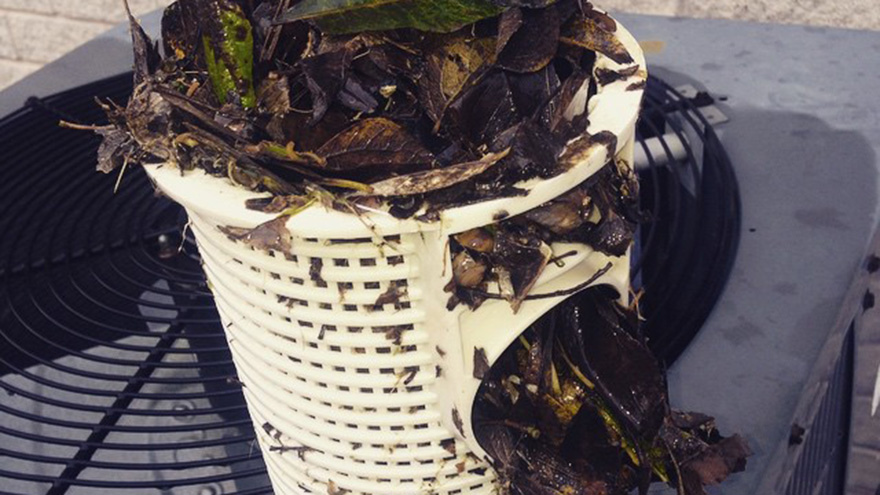1.) Empty your baskets. If you have lots of vegetation around your pool you should be checking and emptying all of your baskets. Most pools are set up with two skimmers thateach have a basket in them. The circulation pump will also have a basket in it. The skimmer baskets are there to collect all of the leaves and debris on the pool surface before it saturates and sinks to the bottom of the pool. Too much debris collecting in the baskets will result in poor water flow. When the water flow slows down there won’t be as much movement on the surface of the pool to push debris into the skimmers.
Your circulation pump also has a basket that acts as a back up to the skimmer basket. Any debris that slips past the skimmer baskets will collect in this pump basket. This will prevent larger debris from going into the pump and clogging the pump impeller which can cause the motor seal to go bad and can even cause the pump motor to go out.
You want to be sure that these skimmer baskets are in good working condition and doing their job. Check for things such as any cracks that debris could be slipping through. You also want to check that the basket is not floating up when the system turns off and allow debris to pass by. There are several brands and types of skimmer baskets out there that come with different handles and some even have a built-in weight to prevent them from floating up.
2.) Net out any excess debris in the pool. Letting debris build up in the pool will result in full baskets/bags, an increased level of phosphates from organic material, and staining of your pool plaster.
3.) Don’t try to balance the water chemistry yourself. If you are paying a professional to maintain the pool there should never be the need foryou to be adding chemicals. I’m not talking about adding some shock after a Saturday of the kids and the dog splashing around, that is perfectly fine. I’m talking about trying to add algaecides, acid, PHadjusters, and so on. It will make your pool guy’s job very difficult if both you and them are trying to maintain water chemistry. They may even charge for additional chemicals needed to try to correct the balance.
At this point you are probably thinking “I pay a pool company to do this.” This is true, but you are paying them for their time. If you do these things in between scheduled cleanings it will allow your pool guy to spend more time on chemical testing & balancing, brushing your plaster, and performing a thorough equipment check rather than spending the entire time chasing leaves and pulling lawn chairs from last weekend’s BBQ out of the bottom of the pool. In some cases it can contribute to keeping your weekly cleaning rate down.
These three tips will have a huge impact on your pool staying beautiful. Your equipment will run smoother, your plaster will last longer, and your pool guy will be able to do his job better.
Notes:
- It is a good habit to empty your baskets in between your scheduled cleaning.
- Depending on your location you may have to empty them multiple times.
- Remember that full baskets will result in poor circulation and restricted water flow to the circulation pump which can lead to a number of other problems.
- For those of you that have a Polaris or similar style floor cleaner, don’t forget to occasionally empty the bag.
- Net any excess debris from pool surface and floor.
- Try to stay away from adding your own chemicals unless simply shocking after heavy pool use.

